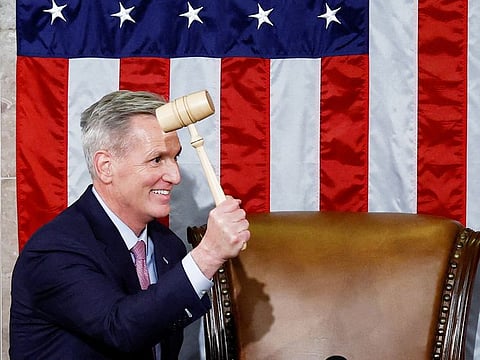US House Speaker Kevin McCarthy: Driven by ambition
Affable in the face of adversity, he's no policy strategist or conservative ideologe

Washington: Kevin McCarthy's election to his dream job of speaker of the US House of Representatives was secured through a mix of bombproof ambition, a talent for cutting deals and a proven track record of getting Republicans what they need.
Affable in the face of adversity, and a prolific fundraiser for his fellow lawmakers, McCarthy is no policy strategist or conservative ideologue.
Instead, his rise has come from his willingness to tackle the tricky task of trying to keep his party - which has been turned upside down by Donald Trump - on the rails and focused on opposing the Democrats' agenda.
His career has soared since he became the minority Republican leader in the California Assembly in 2003, just one year after being elected.
Four years later, he was elected to Washington, and moved rapidly up the ladder in the House as a team player and organizer who readily bared his ambition to become party leader.
But it remains to be seen if the 57-year-old can charm hardline conservative dissidents.
He only won election as speaker after they forced him to endure 15 rounds of voting - a torrid spectacle unseen in the US Capitol since 1859.
They attacked the things that underpinned his approach: chummy business ties, fundraising and keeping others happy, rather than turning conservative ideals into legislation.
But for McCarthy, the job was the hard-won payoff for his labors and his troubled election.
"He's relentless, the man does not quit," longtime ally Patrick McHenry told the chamber late on Friday.
Firefighter's son
McCarthy, who represents the conservative enclave of Bakersfield, California, has been in politics since his late teens.
The son of a firefighter and grandson of a cattle rancher, he married his high school sweetheart.
The couple still live in the first house they bought, where they raised two children.
He became a Republican activist while at California State University in Bakersfield, and worked for local politicians and in national Republican organizations after graduating.
In 2002 he won election to the state assembly. A year later, his fellow Republicans made the freshman legislator their leader.
And four years later, he captured the Bakersfield seat in the US House of Representatives.
Patient and pragmatic, since entering Congress, McCarthy has focused most of his efforts on propelling his party forward.
He has led the Republican caucus in the lower house since 2014, and in 2015 made his first bid for the speakers gavel.
'My Kevin'
But in his years in Congress, he lacks any major legislative achievements of his own.
He never chaired a House committee, where most Congressional leaders build their names and hone legislative skills.
And he is not known for any well-defined set of principles, beyond defeating Democratic interests and stalling the agenda of President Joe Biden.
In the immediate aftermath of the January 6, 2021 assault on the Capitol by supporters of president Donald Trump, for example, he told fellow lawmakers that Trump should resign.
But weeks later he visited the Trump at his Florida home to make amends.
Since then, McCarthy has labelled investigations by Congress and the Justice Department of the insurrection politically motivated.
Trump, who is running for the presidency again in 2024, meanwhile refers to McCarthy as "My Kevin."
Underestimated
McCarthy's seeming lack of deep ideological underpinnings and his skepticism of party hardliners has made him a regular target of the Republican right, especially Trump supporters.
Matt Gaetz, the lawmaker who led the challenge to McCarthy becoming speaker, called him someone who "has sold shares in himself for more than a decade."
Nevertheless, McCarthy is a consummate networker, admired for his people management: meeting his members' demands when he can, and assuaging their concerns when he cannot.
That even includes supporting the lawmakers who opposed him.
According to Politico, the conservative activist groups close to him put some $1 million into the election campaigns of the 20 lawmakers who initially blocked his election to speaker.



